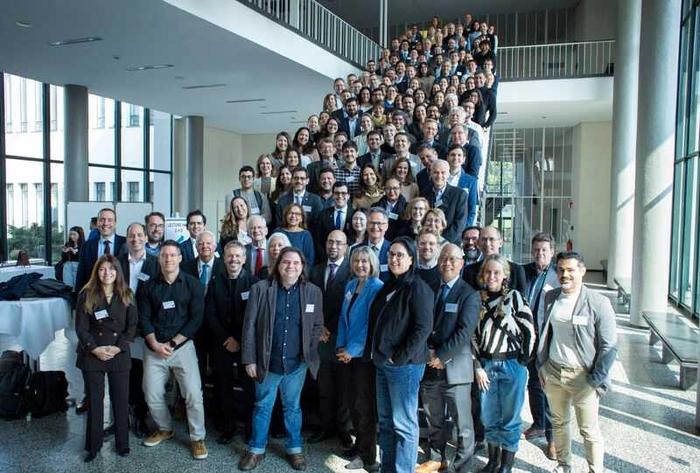The international landscape today is characterized by volatility and uncertainty, presenting a compelling opportunity for Brazil and Germany to enhance their collaboration in the realms of science and technology. This sentiment was echoed by several key participants during the opening ceremony of FAPESP Week Germany, held on March 25 at the historic Free University of Berlin. The event served as a platform for promoting partnerships between researchers in São Paulo and their German counterparts, specifically focusing on fostering innovation and collaborative problem-solving.
Throughout the two-day event, representatives from 89 universities and research institutes in Germany came together with scholars from São Paulo to discuss pressing global challenges and the ways in which joint research efforts could provide solutions. Günter Ziegler, the Rector of the Free University of Berlin and spokesperson for the Berlin University Alliance, emphasized the imperative for academic cooperation, especially in times marked by misinformation, populism, and societal instability. He articulated how scientific collaboration serves as one of the pillars of democracy and academic freedom, which are critical for nurturing an informed and engaged society.
In a compelling address, Marco Antonio Zago, President of FAPESP, highlighted the potential for transformative partnerships between the scientific communities of both regions. Zago pointed out a remarkable statistic: in 2021 alone, researchers from São Paulo published approximately 2,000 articles in collaboration with their German peers. This figure is indeed double the volume of publications recorded merely six years prior, suggesting a robust upward trend in collaborative research activities.
The significance of this collaboration is underscored not just through numbers but also through the tangible benefits it brings. With an average publication impact measure of 3.5, more than half of these collaborative efforts appeared in journals that rank among the highest globally. This kind of impactful research indicates a commitment to advancing knowledge and addressing critical issues that affect both Brazil and Germany, as well as the broader international community.
As discussions progressed during FAPESP Week Germany, it became evident that the relationship between São Paulo and Germany is multi-dimensional, encompassing various forms of collaboration. From small bilateral projects to expansive research initiatives, the intention is to create platforms that are accessible to academics and private companies alike. The emphasis on including corporate partners in academic research is significant, as it aligns with the current trends of translational research where findings must reach practical applications.
Alongside the scientific leaders, Heide Ahrens, Secretary General of the German Research Foundation (DFG), affirmed the ongoing partnerships between FAPESP and numerous German institutions, such as the Max Planck Society and the German Academic Exchange Service (DAAD). Ahrens expressed optimism about nurturing early-career researchers by providing them with opportunities to engage in international projects, essential for building a vibrant scientific careers and stimulating innovation.
Brazilian media played a crucial role in amplifying the discussions held at FAPESP Week Germany. Paulo Gustavo Iansen de Sant’Ana, Minister-Counselor of the Brazilian Embassy in Germany, articulated the importance of showcasing Brazilian scientific talent and how such events serve to reinforce Brazil’s global image. He asserted that the fruitful relationship between the two nations could yield mutual benefits, enriching both academic platforms and governmental partnerships.
Each session at the event focused on different thematic areas, delving deep into how academic research can address environmental, social, and technological challenges. Expert panels dissected ongoing issues such as climate change, public health, and digital transformation, inspiring ideas for potential research agendas that could emerge from such cross-cultural cooperation. The tone shifted towards a hopeful outlook on the future, illustrating a renewed spirit among scientists eager to build lasting relationships beyond their respective borders.
Moreover, the event also spotlighted the necessity for academic institutions to defend and uphold the integrity of research. In times when misinformation proliferates, the responsibility of scholars to engage in ethical, impactful, and transparent research has never been more pressing. Leaders from both Brazilian and German institutions committed to this cause, highlighting the nuanced relationship between science and society as a whole.
The implications for Brazil’s scientific landscape also resonate with the nation’s strategies for improving its international standing in research and innovation. By fostering partnerships that enable knowledge exchange and collaborative creativity, Brazil can securely position itself within the global research arena, which is increasingly adopting interdisciplinary approaches. This creates opportunities for a comprehensive understanding of complex issues that affect both nations.
As FAPESP Week Germany concluded, the commitment to nurturing scientific collaboration between Brazil and Germany remains steadfast. The wealth of knowledge and experience shared during the event is expected to lay down the framework for future initiatives. Such endeavors will not only strengthen academic ties but will also encourage innovative solutions to global challenges.
The essence of this collaboration constitutes a bridge connecting the two countries—a partnership that transcends geographical confines to unite their strengths in research. As both nations confront an array of challenges, the synergy cultivated through events like FAPESP Week Germany is essential for fostering a pioneering spirit that can navigate the complexities of today’s world.
In this light, the call for ongoing engagement is clear. Scientists, policymakers, and institutions alike must strive for sustained dialogue and collaboration to unlock new potentials that can derive from shared research goals and complementary expertise. The fabric of scientific collaboration continues to expand, weaving together the intellectual resources of Brazil and Germany in unprecedented ways.
In conclusion, as the scientific community stands at the crossroads of innovation and discovery, initiatives such as FAPESP Week Germany symbolize the collaborative efforts required to tackle pressing global challenges. Scientific cooperation between Brazil and Germany is not merely an advantageous relationship; it is a necessary pathway toward realizing a sustainable and equitable future through research.
Subject of Research: Scientific collaboration between Brazil and Germany
Article Title: Strengthening Scientific Ties: A Collaborative Future for Brazil and Germany
News Publication Date: March 25, 2023
Web References: Not applicable
References: Not applicable
Image Credits: Credit: Christian Demarco
Keywords: Scientific collaboration, international cooperation, academic freedom, research partnerships, innovation, Brazil, Germany, FAPESP, scientific community, technological cooperation.




